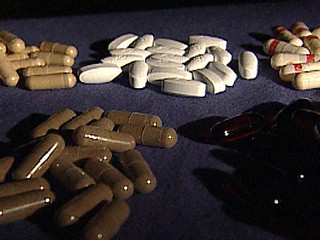Niacin-Statin Combo Offers No Benefit, Study Finds

ABCNEWS.com Photo
Niacin, in combination with a cholesterol-lowering statin, didn’t lower the risk of having a heart attack, stroke, or other cardiovascular “event,” and actually slightly increased the risk of strokes in people with heart disease whose LDL (“bad”) cholesterol is under control, according to a study in this week’s New England Journal of Medicine.
As a result, the National Institutes of Health’s National Heart, Lung, and Blood Institute (NHLBI), which funded the research, stopped the study more than a year early.
In an accompanying editorial, Dr. Robert Giugliano of Brigham and Women’s Hospital in Boston, asked whether it might be time to “retire” niacin, used as a cholesterol reducer since 1955.
“Given the lack of efficacy in this trial … and the unresolved question of an increased risk of ischemic stroke, one can hardly justify the continued expenditure of $800 million per year in the United States for branded extended-release niacin,” he wrote. However, he added there could be some benefit in using niacin in patients unable to tolerate statins to lower their LDL cholesterol.
The NHLBI originally reported the findings back in May when the agency announced the end of the clinical trial. The study investigators presented their data Tuesday at the American Heart Association’s annual meeting.
The trial, known as AIM-HIGH, involved more than 3,414 patients with cardiovascular disease who lowered their LDL cholesterol using statins. They received either a high dose of extended-release niacin (Niaspan) with simvastatin (Zocor), or Zocor and a placebo for 32 months, when the trial was stopped.
While the niacin-statin combination therapy increased HDL (“good”) cholesterol and lowered the amount of fat in the blood better than the use of a statin-only regimen, it didn’t reduce the number of heart attacks, strokes, or hospitalizations for certain other heart problems.
“The lack of effect on cardiovascular events is unexpected and a striking contrast to the results of previous trials and observational studies,” co-investigator Dr. Jeffrey Probstfield said in an NHLBI statement after initial release of the study results in May.
Prior research has shown significant niacin-associated declines in the rates of death, heart attacks and strokes, but these studies, noted the NHLBI, did not specifically address what happens when HDL is increased and LDL is controlled. Other niacin clinical trials are ongoing.
“The results from AIM-HIGH should not be extrapolated to apply to potentially higher-risk patients such as those with acute heart attack or acute coronary syndromes, or in patients whose LDL cholesterol is not as well-controlled as those in AIM-HIGH,” said Dr William E. Boden, also a co-investigator, in a statement.
But experts not involved in AIM-HIGH stress that people should not stop taking niacin, also known as vitamin B3 and nicotinic acid, or other cholesterol-lowering drugs without consulting their doctor first.
“Niacin has good lipid effects,” said Dr. Christopher Cannon, senior investigator of the TIMI study group at Brigham and Women’s Hospital in Boston. “Sometimes, people hear negative lipid drug news and get confused and stop their statins that we know are beneficial. That would be bad.”